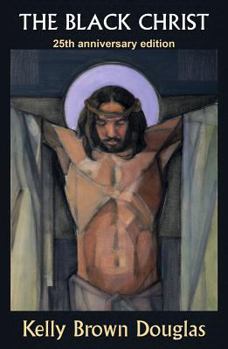The Black Christ: 25th Anniversary Edition
Select Format
Select Condition 
Book Overview
In this classic work, first published in 1994, Kelly Brown Douglas offers a compelling portrait of who Jesus is for the Black community. Beginning with the early testimonies of the enslaved, through the writings and thought of religious and literary figures, voices from the Civil Rights and Black Power era, including Martin Luther King, Jr., and Malcolm X, up through the contemporary work of Black and Womanist theologians, Douglas presents a living...
Format:Paperback
Language:English
ISBN:162698316X
ISBN13:9781626983168
Release Date:February 2021
Publisher:Orbis
Length:160 Pages
Weight:0.48 lbs.
Dimensions:0.3" x 5.4" x 8.2"
Customer Reviews
1 rating
A Search for a Universal Image of Christ...
Published by Thriftbooks.com User , 17 years ago
Christ is black. But appearance is only a piece of it; Christ is black in his solidarity with the Black community in US America, struggling in the face of White racism. Kelly Brown Douglas, in this quick and to-the-point synopsis, re-members the historical origins of the black Christ, his theological development and then asks some critical questions about the black Christ in her own context - now almost fifteen years ago. We enter the history, with Douglas, during the height of slavery in US America. Douglas identifies two types of Christianity that live among both Blacks and Whites in the States at that time. "Slave Christianity" saw Jesus (the Black Christ) as liberator, identifying with the Black community's struggle for health and freedom. "Slaveholding Christianity" justified slavery and made Jesus (the White Christ) into an icon of hope for the future - things would be better in the "bye and bye." The Black Christ, then, as Douglas argues, developed early - if not explicitly - within the imaginations of adherents to "Slave Christianity." During the Civil Rights Struggle and Black Nationalist movements of the sixties and seventies, people like Martin King and Malcolm X propelled concepts of the Black Christ into more explicit - and public - consideration. Culminating in X's claim in a 1963 interview that "Christ wasn't white; Christ was a black man," Black Christianity - like Slave Christianity before it - began, more explicitly, to highlight Christ's connection to the struggle for Black freedom in the context of lived history - disregarding for a time "Slaveholding (White) Christianity's "bye and bye." Forced into action, Douglas claims, by the bold, public assertions of people like King and X about the nature of Black Christianity - and the Black Christ - Black theologians began thinking critically about the color of Christ. By the early seventies, though in differently nuanced ways, three Black theologians - Albert Cleage, James Cone and J. Deotis Roberts - had claimed that, indeed, Christ was black. Cleage thought Jesus was historically a black man. Cone imagined his blackness to lie sufficiently in his struggle with Black people. And Roberts understood his blackness to be a particularizing image among many possibilities of imaging Jesus in the world. But, Kelly Brown Douglas wonders, is Christ's blackness enough. She, along with other womanist scholars, question whether race is the only obstacle on the path toward freedom. She imagines, in the end, that the blackness of Jesus is only one part in the multifaceted struggle which with he identifies. Christ is Black, she affirms, but suggests he's also female, same-sex oriented, economically disadvantaged and so on. Douglas, I think, does a helpful thing in so clearly and concisely presenting the history of the Black Christ. For those who've never imagined the possibility of a black Christ - either White or Black; for those who've been inclined to accept a black Chri





